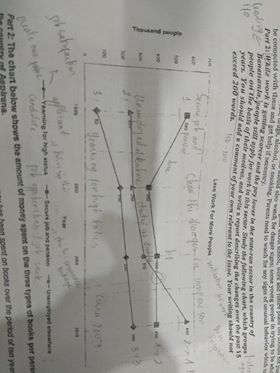theblacktea
Aug 3, 2018
Writing Feedback / People's motivation to work in the state-run sector in the country of Bananala during 1995-2010. [2]
Can somebody help me with this, please? I am really in a hurry, thank you!
The chart gives information regarding people's motivation to work in the state-run sector in the country of Bananala during 1995-2010.
Overall, the trend was a rise in all driving factors, apart from the insurance-packaged one.
Through the first five years, the number of candidates for job security dived drastically, from over 580 thousand to 380thousand ones. However, after that it made a partial recovery to reach a plateau of 450,000 in 2005. The rate of applicants with the fear of being unemployed started off steadily and increased two-fold afterwards. Since then, it had surpassed the secure job circa 2007 before soaring to 650 thousand. People who wanted to create their own popularities in career rose significantly in the first 5 years, yet increasing more gradually 10 years later to reach the rate of 300 thousand.
In the mid-1990s, the highest number of applicants were recorded in the job security sector probably due to the feeling of safety if they become an official staff rather than the sastisfaction of having higher status. Interestingly, this situation changed remarkably 15 years later as the fright of being unemployment became prominent, leaving the guaranteed job and the desire of higher status to be in the second and third favored respectively. More and more people applied for the public sector to seek for promotion, evidenced by a fivefold increase, as the driving factor was the satisfaction of being recognized. Meanwhile, candidates in the unemployed elsewhere sector rocketed probably owing to the popularity of the unemployment rate with a decrease in the job opportunities.
Can somebody help me with this, please? I am really in a hurry, thank you!
WORK MOTIVATION
The chart gives information regarding people's motivation to work in the state-run sector in the country of Bananala during 1995-2010.
Overall, the trend was a rise in all driving factors, apart from the insurance-packaged one.
Through the first five years, the number of candidates for job security dived drastically, from over 580 thousand to 380thousand ones. However, after that it made a partial recovery to reach a plateau of 450,000 in 2005. The rate of applicants with the fear of being unemployed started off steadily and increased two-fold afterwards. Since then, it had surpassed the secure job circa 2007 before soaring to 650 thousand. People who wanted to create their own popularities in career rose significantly in the first 5 years, yet increasing more gradually 10 years later to reach the rate of 300 thousand.
In the mid-1990s, the highest number of applicants were recorded in the job security sector probably due to the feeling of safety if they become an official staff rather than the sastisfaction of having higher status. Interestingly, this situation changed remarkably 15 years later as the fright of being unemployment became prominent, leaving the guaranteed job and the desire of higher status to be in the second and third favored respectively. More and more people applied for the public sector to seek for promotion, evidenced by a fivefold increase, as the driving factor was the satisfaction of being recognized. Meanwhile, candidates in the unemployed elsewhere sector rocketed probably owing to the popularity of the unemployment rate with a decrease in the job opportunities.

38298047_69271342107.jpg
